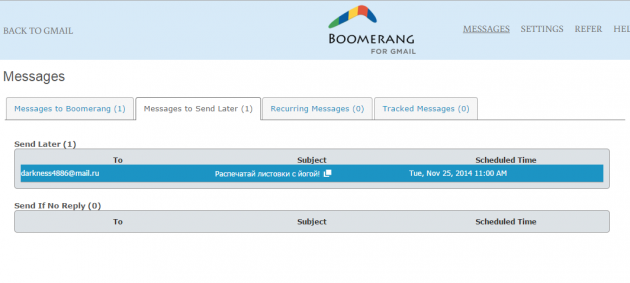The author of the book Successful Mistake with the nickname Turndog collected the opinions of 100 entrepreneurs on how to succeed. From the many stories told, mistakes that have been made in the past, and lessons that entrepreneurs have received, you can learn a lot of useful information for yourself.
Here are eight ways to better manage your time and energy that many of the surveyed entrepreneurs use.
It is difficult to overestimate the importance of resending an email if you want to get a guaranteed response to your letter.
One email is often ignored: it can get lost among other emails, they will decide to answer it later when there is time, and they will never do it. But if the same email arrives a certain time after the first one, the chance of getting a response increases dramatically.
To remember which emails to send when and automate this process, you can use services like Boomerang or SaneBox.

With the help of these programs and applications, you can set the time of sending an email, as well as the time of resending if the message is not read or opened at all.
Well, due to the delayed sending of email, you will never forget to send messages, no matter how many clients you have.
If you send approximately the same text over and over again, save one verified version somewhere and paste it into the email. This way you will save time and avoid stupid mistakes that may accidentally creep into your text, especially if you type a message in a hurry.
But still don't forget to personalize each letter by adding a unique introduction. Your clients are not idiots, they will notice that the letter is "robotic" and, most likely, they will simply not finish reading it.
Marianne Cantwell, author of the book Free Range Humans, checks email only twice a week. And Srini Rao, the creator of Unmistakable Creative, removed almost all applications from the phone altogether so that they would not interfere with his work.
If you are not ready for such drastic measures, just try to spend less time checking email and writing responses.
Reply to email in a few short sentences — it will save you a lot of time.
Many people, when they first send an email to potential customers, try to interest them in long texts, listing all the advantages and reasons to respond to this letter.
This is a fundamentally wrong approach. Firstly, your clients don't have time to read everything you've written. Yes, and you could come up with a better use for your time.
Greg Hickman, a marketer and entrepreneur, uses the five-sentence rule to write an email. So his letters are short, like SMS.
Try to use this rule, and your emails will become more capacious and readable — a little meaningful text instead of a canvas that you don't want to read at all.
Ari Meisel, author of Less Doing, More Living, has achieved success through self-understanding. When he was diagnosed with Crohn's disease, Ari delved into understanding himself, analyzed his whole life and healed in a few months.
To grow and develop, you need to understand yourself better.
Track what you do and don't do, how much time and money it takes.
Only with the help of constant monitoring will you be able to see the direction for development and improve your activities.
Clay Collins, Co-founder LeadPages.net , advises checking every idea before putting it into practice. However, he is not the only entrepreneur practicing this approach. Many other businessmen also consider it rational.
Before you implement any idea, no matter how beautiful it may seem to you, it's worth checking whether people need it. Otherwise, it's like setting up a dinner with a person without knowing if he wants to have dinner with you at all.
When Corbet Barr, a blogger, entrepreneur and founder of Fizzle, lost his business, he went on a six-month trip to Mexico. Designer Desiree East ran away from problems in Bali for six months.
As strange as it may sound, but sometimes it's useful to run away to find new ideas and shift the focus to the right things. In the long run, it helps to save time, money and nerves.
This is an important skill, without which you can lose everything. For example, entrepreneur Erin Blaskey lost her business because of this and returned it only when she learned to say "no".
This does not mean that you should reject all the opportunities that are offered to you. Just learn to feel comfortable giving up anything — a cup of coffee, a Skype conference, or the introduction of an innovation that you don't like.